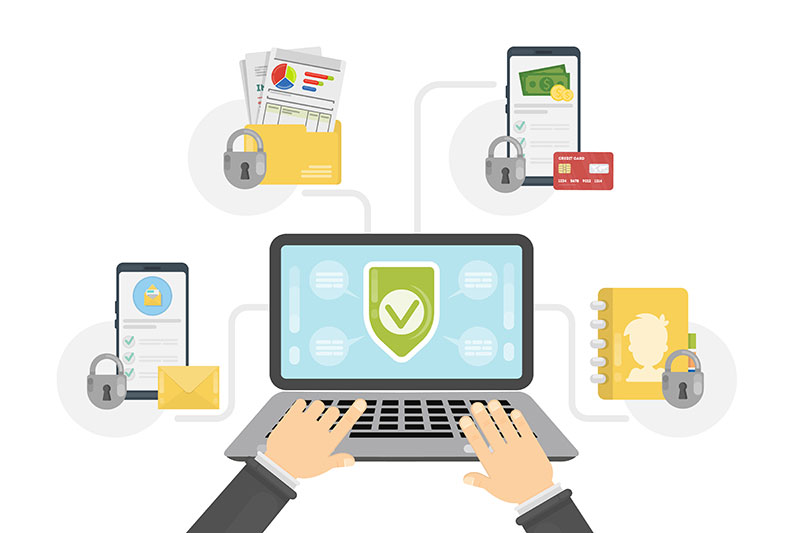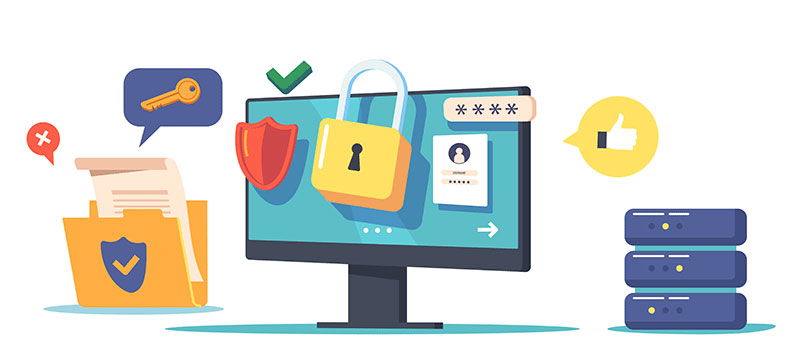How To Improve Your Ecommerce Security in 2023
Magical Mirror on the wall, is my eCommerce website safe? We wish life would be this simple. Unfortunately, it’s not! It takes more than a magical mirror to guarantee your eCommerce security.
Today, keeping online security is not exactly a walk in the park. But don’t worry. We got your back. We will be sharing some valuable tips that will help to arm your online business. So, are you ready to win this battle?

What Is eCommerce Security?
Insecure websites are vulnerable to cyberattacks. They hamper your business workflows and damage your reputation. Regaining customers’ trust becomes challenging.
ECommerce security guidelines help you prevent data breaches and other cybercrimes. They aid your clients in conducting smooth and secure transactions, enhancing customers’ positive experiences.
Without proper security protocols in place, your business will suffer from data breaches, revenue losses, customer attrition, and financial frauds.
Unfortunately, cybercriminals are just waiting to tear your ecommerce security down and profit from it.
That’s why you should implement safety protocols to keep such security issues far away from your online business.
– How to Set Up an Online Business
Common eCommerce Security Issues
When you understand the root cause of problems, you deal with them in a better way.
Let’s go through some common security troubles that companies face on a daily basis.
SQL Injections
Structured Query Language is commonly used to access databases. But hackers use it to manipulate databases. Meaning — they can change records or completely remove them from your directories.
Cyber attackers inject malicious code into your website to subvert its logic. They can also retrieve hidden data using the SQL injecting technique.
Cross-Site Scripting
Cross-site scripting is generally known as XSS. Hacker leverages XSS to compromise interactions between your website and clients.
They insert malign codes into your application to redirect users to a malicious website, resulting in data loss.
DDoS Attacks
Distributed Denial of Service attack is the most annoying threat that eCommerce security goes through.
Cybercriminals flood your online business with illegitimate traffic. This slows down your website and makes it impossible for consistent clients to access it.
– How to create a successful Sales Page
Malware Infections
One of the most popular methods that hackers use to steal sensitive information is infecting your website with malware. It includes nasty things such as ransomware, spyware, viruses, worms, and more.
Malware can extort money from your customers, show confidential files and disrupt the functioning of your website.
Bots
There are good bots that help streamline operations; then there are bad bots that spam your eCommerce stores. These bots basically steal inventory and pricing information from your website.
Hackers use them to change your product prices, declining your sales and negatively affecting your revenue cycle.
They usually use bot kits found on the dark web to plant viruses and perform nefarious tasks.
eCommerce Security Tips
Now that you have an idea about eCommerce security threats, let’s see how you can defend your business from such cyberattacks.
Leverage HTTPS
HTTPS uses SSL/TLS certification to protect your data from hackers. You can get your online store SSL certified.
Some SSL vendors supply certification for an exceeding cost. You can buy Wildcard SSL Certificate to secure multiple subdomains if you are running an ecommerce business.
With SSL certification your information will be encrypted and unreadable by hackers.
– What are the types of SSL security certificates?
Never Store Credit Card Data
You should not collect private customer data unless it’s necessary. Storing clients’ credit card information puts their accounts at risk.
Hackers can commit financial frauds and defraud your customers. The end results — losing clients’ loyalty and dealing with multiple lawsuits.
You should use a third-party checkout tunnel to process payments to save your business from cybercriminals.
– Quick Guide to Online Payment Systems
Safety Plugins: Your Knights in Shining Armor
Cyber attackers can crack your customers’ passwords. Such attacks can lower your authoritativeness in Google rankings.
Safety plugins help you protect your online store from such brute force attacks. They also detect eCommerce security threats to help you take prompt action.
There are several types of safety plugins available, and each provides a different set of features and functionalities. Some common options include:
- Firewall plugins – act as a barrier between a website or application and the internet, filtering incoming traffic to prevent malicious requests from reaching the site.
- Malware scanners – scan websites for malicious code or software and alert the site owner if any are found.
- Login protection – help prevent unauthorized access to a website or application by implementing measures such as two-factor authentication or login rate limiting.
- Security monitoring – continuously monitor a website or application for security events, such as failed login attempts or malware detections, and notify the site owner of any suspicious activity.
While standard plugins and best practices help safeguard your online store from basic threats, facing sophisticated cyberattacks often requires outside expertise.
Partnering with red team assessment experts enables you to test your site’s resilience through comprehensive attack simulations, bridging the gap between everyday safeguards and advanced security readiness.
Assist Your Customers in Protecting Themselves
You can’t expect customers to have in-depth knowledge about protection measures.
You can encourage clients to include special characters in their passwords. You can also set two-factor authentication to keep clients’ accounts safe from hackers.
Some businesses use OTPs (One-Time Password) to verify customers’ credentials, which is a security mechanism used to authenticate users or transactions. It is a password that can be used only once and is generated for a specific session or transaction.
Secure Your Admin Dashboard
Hackers gaining access to your admin dashboard can become your worst nightmare. Apart from stealing confidential files, they can lock you out of your online store.
Businesses forget to change their admin login credentials. Their usernames and passwords are predictable — username: admin; password: 1234.
You should set a strong user ID and access code to reinforce your eCommerce security and keep your website free from hackers.
Implement Multi-Layer Security
You should employ a multi-layer security system. Some of the identity verifications methods are as follows:
- Two-Factor: Users need to acknowledge their login tries through a different device.
- Two-Step: Customers need to enter an OTP received via phone, text or email.
- Multi-Factor: Users have to provide two or more different forms of authentication to access a system or account. These forms of authentication can include something the user knows (such as a password), something the user has (such as a token or smartphone), and something of the user (such as a fingerprint or facial recognition).
Make Backups Your Best friends
It’s frustrating to discover that your online store has been hacked and your data was manipulated. In such cases, backups provide you with reliable information.
You can restore your website to its original version and implement tight protection measures. It’s recommended to perform backups at least once a day.
Maintain PCI Standards
You should regularly conduct PCI scans to detect issues before they arise.
PCI (Payment Card Industry) scans refer to a set of security assessments conducted on businesses that accept credit and debit card payments.
These scans help you close eCommerce security gaps and protect your data from cyber attackers.
Businesses accepting credit card transactions need to follow Payment Card Industry and Data Security Standards.
Monitor Your E-Commerce Website
Just because you implemented tight eCommerce security measures doesn’t mean cyber attackers cannot access your website.
You should regularly check your website activity to detect unusual behaviors. You should also keep an eye on your downloads and integrations. Sometimes a malicious file can damage your online business.
Never Underestimate Your Security
You did everything to save your eCommerce store from cybercriminals. But what about your personal data?
When hackers are unable to pursue your website, they try decrypting your personal information. And through your confidential files, they could invade your business secrets too. So don’t forget to secure your private documents.
Place your business in a secure platform

You need to follow critical protection measures to tighten your eCommerce security. Make it a practice to run website audits to find and resolve unusual activity.
Think twice before clicking suspicious links. And follow all the measures mentioned above to keep your website safe.
If you’re starting your business from scratch and don’t have the time or money to invest in developing your own website, invest in reliable platforms to host your business.
– How much does it cost to build a website for your business?
Those who create online courses can rely on Coursify.me to guarantee the security and integrity of their data and that of their students.
When opting for a teaching platform that operates on the SaaS model (software as a service), such as Coursify.me, you only pay a monthly fee to enjoy all its functionalities, like the possibility to receive online payments in different currencies.
Optimized for SEO and compliant with all data protection laws and requirements, Coursify.me is a secure, dynamic and customizable Learning Management System.
Serving companies and professionals in more than 60 countries, it is the ideal solution for those who want to create, promote and sell courses on the internet.
– Whats is a Learning Management System
It is important to note that Coursify.me hosts every online course with redundancy and backup so you have a safe and reliable environment.
To learn more, visit our website, test the platform and understand why we are the best option for your business.

